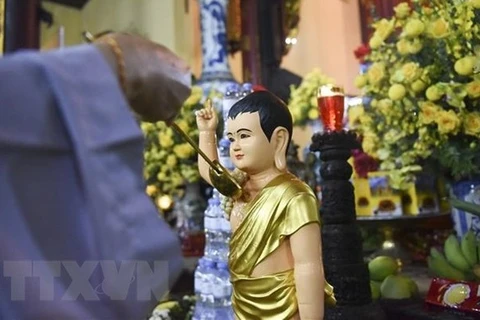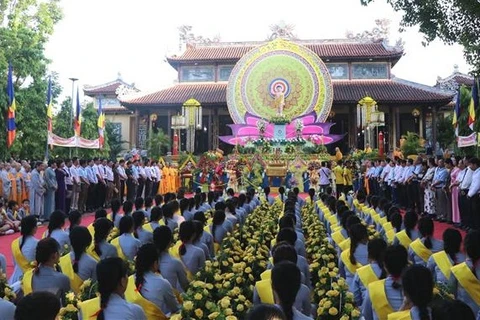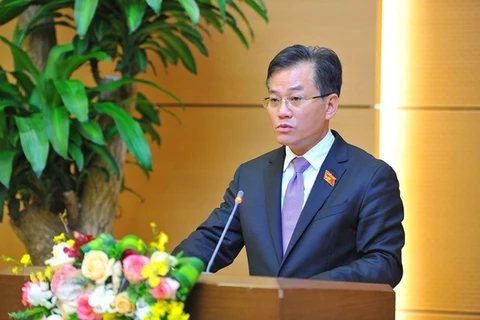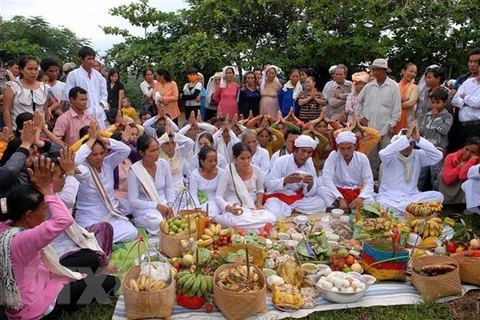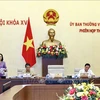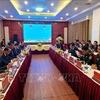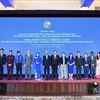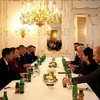
Hanoi (VNA) – Ethnic and religious issues in the Central Highlands have been frequently abused by reactionary and hostile forces to undermine Vietnam. However, those forces have always failed because of people’s solidarity and support for authorities’ reactions.
The Central Highlands is home to nearly 6 million people from all the 54 ethnic groups of the country, including nearly 2.2 million from 53 ethnic minorities or 37.5% of its population.
With demand for beliefs of local ethnic groups, those of migrant people, and cultural flows, this region boasts a rich diversity of beliefs and religions, of which Catholicism, Buddhism, Protestantism, and Caidaoism are major ones.
There are about 2.3 million religious followers, nearly 4,000 dignitaries, 10,000 sub-dignitaries, and more than 1,300 places of worship here at present.
Therefore, reactionary and hostile forces have frequently taken advantage of ethnic, religious, democratic and human rights issues in the Central Highlands to drive a wedge into the great national solidarity and trigger security disturbances, as seen in the terrorist attacks in Ea Ktur and Ea Tieu communes of Cu Kuin district, Dak Lak province, on June 11.
Ethnic, religious affairs abused to sow division
After the 2004 disturbance led by Ksor Kok in an attempt to establish a so-called “Degar State” was settled and its “Degar Protestantism” abolished, security and order in the Central Highlands were restored and peace returned to the region.
However, reactionary and hostile forces haven’t abandoned their plots to incite the narrow-minded nationalism, extremism, and separatism.
They include the so-called “Central Highlands Protestant Church of the Christ” (CHPC), a reactionary organisation under the cloak of religion which is led by the exiled “United Front for the Liberation of Oppressed Races” (FULRO) and backs a group named “Montagnards Stand for Justice” (MSFJ) (set up in 2019) to incite residents in Cu Kuin and Krong Ana districts of Dak Lak province to engage in riots attempting to establish a separate “Degar State” in the five Central Highlands provinces.
In the June 11 attacks on the headquarters of the People’s Committees of Ea Ktur and Ea Tieu communes, they not only triggered sabotage or protests but also incited the use of force and murder. Those involved acted in an organised and barbarous manner.

Firm people-based security
The Ministry of Public Security said the incidents in Dak Lak were particularly serious and also terrorist acts against the administration. As soon as the attacks happened, local units of the ministry and the Dak Lak Department of Public Security quickly took measures to guarantee security and safety and hunt the culprits.
In particular, local people actively joined in the hunt. Thanks to their reports, authorities discovered the hideouts of many persons involved in the attacks, and some of the culprits were also captured by locals.
Relatives of many attackers also persuaded them to turn themselves in to the police to seek leniency. As a result, about 72 hours after the attacks, more than 70 persons involved were arrested. All the masterminds were also detained.
To justify the crime, reactionary elements and some hostile newspapers and websites have distorted the nature of the case and cited such groundless reasons as “Kinh people oppress Thuong (Central Highlanders) people” or “Kinh people occupy land of Thuong people” to trigger inhumane acts and resistance against the administration.
However, those acts have encountered strong condemnation from ethnic minorities in the region.
Dinh Thai, a reputable figure of the Bahnar ethnic group in Po Ngal village of Kong Long Khong commune of Kbang district, Gia Lai province, said the attacks in Dak Lak were acts against the Party and the revolution, and that he and all other villagers are against those acts.
Ethnic, religious policies implemented effectively

Taking advantage of ethnic and religious issues to sabotage is not a new ruse by hostile forces. Authorities have confirmed that the case in Dak Lak was not linked with religious affairs.
Among the attackers, many admitted that they had been incited by FULRO to sow division between Kinh people and ethnic minorities, cause disturbances, and attract attention abroad.
Not only helping with hunting the culprits, locals also became a strong source of support for authorities as they offered meals to those on duty and donations to the bereaved families.
People of different ethnic groups and religions in the Central Highlands have long stood side by side with the nation, maintained their trust in the Party and the Government, and contributed to local and national socio-economic development. The credulous persons following incitements of reactionary and hostile forces account for just a very small part. In fact, many who used to follow “evil” religions for many years have realised their mistakes and returned to their families and communities to live a peaceful life./.

